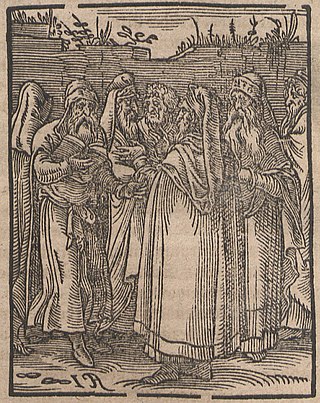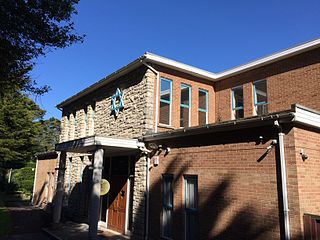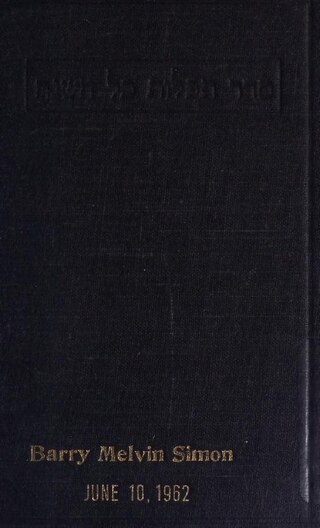Related Research Articles

Judaism is an Abrahamic monotheistic ethnic religion that comprises the collective spiritual, cultural, and legal traditions of the Jewish people. Judaism evolved from Yahwism, an ancient Semitic religion of the late Bronze Age to early Iron Age, likely around the 6th/5th century BCE. Along with Samaritanism, to which it is closely related, Judaism is one of the two oldest Abrahamic religions.

Kabbalah or Qabalah is an esoteric method, discipline and school of thought in Jewish mysticism. A traditional Kabbalist is called a Mekubbal. The definition of Kabbalah varies according to the tradition and aims of those following it, from its origin in medieval Judaism to its later adaptations in Western esotericism. Jewish Kabbalah is a set of esoteric teachings meant to explain the relationship between the unchanging, eternal God—the mysterious Ein Sof —and the mortal, finite universe. It forms the foundation of mystical religious interpretations within Judaism.

Reform Judaism, also known as Liberal Judaism or Progressive Judaism, is a major Jewish denomination that emphasizes the evolving nature of Judaism, the superiority of its ethical aspects to its ceremonial ones, and belief in a continuous revelation which is closely intertwined with human reason and not limited to the Theophany at Mount Sinai. A highly liberal strand of Judaism, it is characterized by little stress on ritual and personal observance, regarding Jewish law as non-binding and the individual Jew as autonomous, and by a great openness to external influences and progressive values.

A siddur is a Jewish prayer book containing a set order of daily prayers. The word siddur comes from the Hebrew root ס־ד־ר, meaning 'order.'

Jewish Renewal is a Jewish religious movement originating in the 20th century that endeavors to reinvigorate modern Judaism with Kabbalistic, Hasidic, and musical practices. Specifically, it seeks to reintroduce the "ancient Judaic traditions of mysticism and meditation, gender equality and ecstatic prayer" to synagogue services. It is distinct from the baal teshuva movement of return to Orthodox Judaism.

The machzor is the prayer book which is used by Jews on the High Holy Days of Rosh Hashanah and Yom Kippur. Many Jews also make use of specialized machzorim on the three pilgrimage festivals of Passover, Shavuot, and Sukkot. The machzor is a specialized form of the siddur, which is generally intended for use in weekday and Shabbat services.

Amram bar Sheshna or Amram Gaon was a gaon or head of the Academy of Sura in Lower Mesopotamia in the ninth century.
Lekha Dodi is a Hebrew-language Jewish liturgical song recited Friday at dusk, usually at sundown, in synagogue to welcome the Sabbath prior to the evening services. It is part of Kabbalat Shabbat.
"Wissenschaft des Judentums" refers to a nineteenth-century movement premised on the critical investigation of Jewish literature and culture, including rabbinic literature, to analyze the origins of Jewish traditions.
Pizmonim are traditional Jewish songs and melodies sung with the intention of praising God as well as learning certain aspects of traditional religious teachings. They are sung throughout religious rituals and festivities such as prayers, circumcisions, bar mitzvahs, weddings and other ceremonies.
UntannehTokef, Unthanneh Toqeph, Un'taneh Tokef, or Unsanneh Tokef is a piyyut that has been a part of the Rosh Hashanah and Yom Kippur liturgy in some traditions of rabbinical Judaism for centuries. It introduces the Kedusha of Musaf for these days. It is chanted while the Torah ark is open and the congregants are standing. It is the "central poem of the High Holy Day [of the Day of Atonement]." The ArtScroll machzor calls it "one of the most stirring compositions in the entire liturgy of the Days of Awe."

The Bournemouth Reform Synagogue, also known as BRS, is a Reform Jewish congregation and synagogue, located in Bournemouth, Dorset, England, in the United Kingdom.
Ruth Langer is a Professor of Theology at Boston College, and an expert on Jewish Liturgy and on Christian Jewish Relations. She is married to Jonathan Sarna.

Mishkan T'filah—A Reform Siddur is a prayer book prepared for Reform Jewish congregations around the world by the Central Conference of American Rabbis (CCAR). Mishkan T'filah is Hebrew for "Dwelling Place for Prayer" and the book serves as a successor to Gates of Prayer, the New Union Prayer Book (GOP), which was released in 1975. In 2015, CCAR released the complementary Mishkan HaNefesh machzor for the High Holy Days. CCAR also produces a host of print and electronic materials to supplement the Mishkan T'filah book.
Dana Evan Kaplan is a Reform rabbi known for his writings on Reform Judaism, in particular, and American Judaism, generally. He has also written on other subjects, including American Jewish history and Jews in various diaspora communities. Kaplan has been the rabbi of Temple Beth Shalom of the West Valley in Sun City, Arizona, since June 2019.
Vetaher Libenu, is a siddur published by the lay people of Congregation Beth El of the Sudbury River Valley, in Sudbury, Massachusetts, to serve the needs of that Reform Congregation. It is the first siddur to use non-sexist, inclusive language and to refer to God using feminine and masculine pronouns.

Rami M. Shapiro, commonly called "Rabbi Rami", is an American Reform rabbi, author, teacher, and speaker on the subjects liberal Judaism and contemporary spirituality. His Judaism is grounded in the perennial philosophy.
Shefa Gold is an American rabbi, scholar, and Director of the Center for Devotional, Energy and Ecstatic Practice (C-DEEP) in Jemez Springs, New Mexico. Gold is a teacher of chant, Jewish mysticism, Jewish prayer and spirituality who Rabbi Mike Comins described in 2010 as "a pioneer in the ecstatic practice of Jewish chant." Her chants have been used in synagogues, minyanim, and street protests; perhaps her most well known being "Ozi V'zimrat Yah". Combining traditional Jewish liturgical music with Hebrew chant, Gold has worked to cultivate a distinctly Jewish gratitude practice. Her "Flavors of Gratefulness" mobile app has 109 different chants for Modeh Ani, the brief prayer traditionally recited by religious Jews upon awakening. In 2024 she released "Flavors of Praise" with 61 different chants.

The Authorised Daily Prayer Book was an English translation of the Hebrew siddur created by Rabbi Simeon Singer. First published in 1890, it has gone through many editions, and is still used in many British Orthodox synagogues and homes.
B'not Esh is a Jewish feminist collective based in the United States that was founded in 1981, the group sought to define a reconstructed feminist view of the Jewish tradition and defines itself as a Jewish Feminist Spirituality Collective. The group's basic position is that the Jewish spirituality of women is a political struggle.
References
- Bibliography
- Hoffman, Lawrence A. (1989). Beyond the Text: A Holistic Approach to Liturgy. Indianapolis: Indiana University Press. ISBN 0-253-20538-7.
- Hoffman, Lawrence A. (January–February 2003). "The Journey Home: Lawrence A. Hoffman contemplates authentic Jewish spirituality". Tikkun . 18 (1): 59–62.
- Cohen, Jack J. (2000). "Chapter 10: Lawrence A. Hoffman". Major Philosophers of Jewish Prayer in the Twentieth Century. New York: Fordham University Press. ISBN 0-8232-1957-7.
- Schattauer, Thomas H. (2007). "Liturgical Studies: Disciplines, Perspectives, Teaching". International Journal of Practical Theology. 11 (1): 106–137. doi:10.1515/IJPT.2007.8. S2CID 143450678.
- Wolfson, Ron (2006). The Spirituality of Welcoming: How to Transform Your Congregation into a Sacred Community. Woodstock, VT: Jewish Lights Publishing. ISBN 978-1-58023-244-9.
- Hoffman, Lawrence A., ed. (1997–2007). My People's Prayer Book volumes 1-10. Woodstock, VT: Jewish Lights Publishing. ISBN 978-1-879045-79-8.
- Reviews
- Kugelmass, Jack; Hoffman, Lawrence A. (April 1990). "Review of Beyond the Text: A Holistic Approach to Liturgy". Anthropological Quarterly. 63 (2). The George Washington University Institute for Ethnographic Research: 101–102. doi:10.2307/3318118. JSTOR 3318118.
- News articles
- Brown, Sarah (2006-01-26). "Emergent Jews". The Jewish Journal of Greater Los Angeles. Retrieved 2010-04-14.
- Cohen, Debra (2002-08-02). "The new Gen-X Judaism". The Jewish Week. Retrieved 2010-04-14.
- Greenberg, Richard (2006-08-31). "Tranforming[sic] the synagogue—A scorecard". The Jewish Journal of Greater Los Angeles. Retrieved 2010-04-14.
- Siegel, Jennifer (2005-05-13). "Synagogue renewal efforts earn mixed results". The Jewish Daily Forward. Retrieved 2010-04-14.